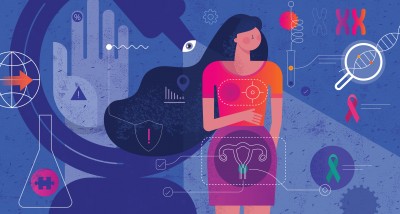The Center for Engineering and Precision Medicine (CEPM), a joint undertaking of Rensselaer Polytechnic Institute (RPI) and the Icahn School of Medicine at Mt. Sinai, is launching an ambitious new initiative that could fundamentally change how healthcare providers diagnose and treat conditions in menopausal women, with an eye toward reducing their risk of chronic disease.
The Multi-Organ Approach to Address Diseases Following Estrogen Loss (MODEL) program, made possible by a significant gift from Rensselaer Polytechnic Institute Trustee Mary Humiston, MBA ‘90, represents the first comprehensive effort to understand how ovarian aging affects the risk for chronic diseases impacting multiple body systems simultaneously.
“What impressed me most about CEPM’s vision for this initiative was its comprehensive scope — rather than studying one disease at a time, these scientists are mapping the entire biological landscape of menopause,” Humiston said. “The potential to do good is extraordinary: better diagnostic tools, more effective treatments, and ultimately, improved quality of life for millions of women worldwide.”
Humiston, an executive with 30 years of global leadership experience in human resources and finance, received her MBA from RPI’s Lally School of Management in 1990. She said she became interested in supporting this initiative because “I’ve lived the challenges myself and have seen how deeply it affects not just women, but their families and communities. We have the chance to transform lives on a profound scale and that is very exciting.”
Current medical practice often treats menopausal health challenges in isolation and can overlook the interconnected nature of how estrogen loss impacts the brain, bones, immune system, heart, and digestive system. That leads to inadequate screening that misses early warning signs, and a fragmented approach to treatment that deals with symptoms separately, rather than addressing or managing the root causes.
The MODEL program aims to usher in a radically different approach by studying how the loss of ovarian function creates ripple effects throughout the body. CEPM researchers will deploy cutting-edge technology across multiple domains, aiming to improve the early diagnosis, clinical management, and treatment of chronic conditions associated with the menopausal transition.
Researchers will use advanced preclinical models to study how ovarian aging affects neurological, skeletal, cardiovascular and digestive health in conjunction with various risk factors. They’re designing an innovative “physiome-on-a-chip” system — a sophisticated laboratory platform that recreates the interactions between brain, bone, heart, gut, ovary, and liver tissues in miniature. The system allows scientists to directly observe multi-organ responses to metabolic changes during menopause, and to test potential treatments with unprecedented precision.
“Our ‘physiome-on-a-chip’ technology lets us recreate the conversation between organs in a dish,” said RPI Professor Deepak Vashishth, Ph.D., co-director of CEPM. “We can literally watch how the ovaries talk to the brain, bones, heart, and gut, and see what happens when estrogen and other metabolites are gradually removed from that conversation.” The initiative will take its findings from bench to bedside by working with patients at Mount Sinai Medical Center to gather additional clinical data capturing changes in other systems.
Researchers at the Future of Computing Institute at RPI and the Hasso Plattner Institute for Digital Health at Mount Sinai will develop artificial intelligence and machine learning (AI/ML) models to identify a broad array of biomarkers associated with menopausal transition. Those biomarkers will form the foundation of a non-invasive clinical test to enable the early assessment and prediction of the chronic conditions associated with menopause, potentially allowing healthcare providers to define, monitor, and manage the risk for those conditions years before symptoms become severe.
The program represents a significant research investment in women’s health and chronic disease risk, an area that has historically been underfunded despite affecting half the global population. The goal is to move discoveries rapidly from laboratory to clinic, with CEPM’s Development Labs working alongside RPI’s Office of Strategic Alliance and Translation (OSAT) to drive validated diagnostic and treatment tools to the commercial market.
“CEPM represents more than just a research center. It serves as a unique accelerator at the interface of engineering and biomedical sciences to create new ventures that have the underlying power of RPI and ISMMS to drive commercial success,” said RPI Institute Professor Jonathan S. Dordick, Ph.D., Vice President for OSAT.
“The MODEL initiative perfectly embodies what RPI stands for: bold, interdisciplinary research that tackles humanity’s most pressing challenges,” said RPI President Martin A. Schmidt ’81, Ph.D. “The fact that we can move this research all the way from basic discovery to clinical application, thanks in large part to our partnership with Mt. Sinai, demonstrates the unique ecosystem we’ve built at RPI.”
About Rensselaer Polytechnic Institute
Founded in 1824 for the application of science to the common purposes of life, Rensselaer Polytechnic Institute is the first technological research university in the United States. Today, it is recognized as a premier university, noted for its robust and holistic learning community that connects creativity with science and technology. RPI is dedicated to inventing for the future, from shaping the scientists, engineers, technologists, architects, financiers, managers, and entrepreneurs who will define what’s next for humanity, to research that bridges disciplines to solve the world’s toughest problems. Learn more at rpi.edu.
